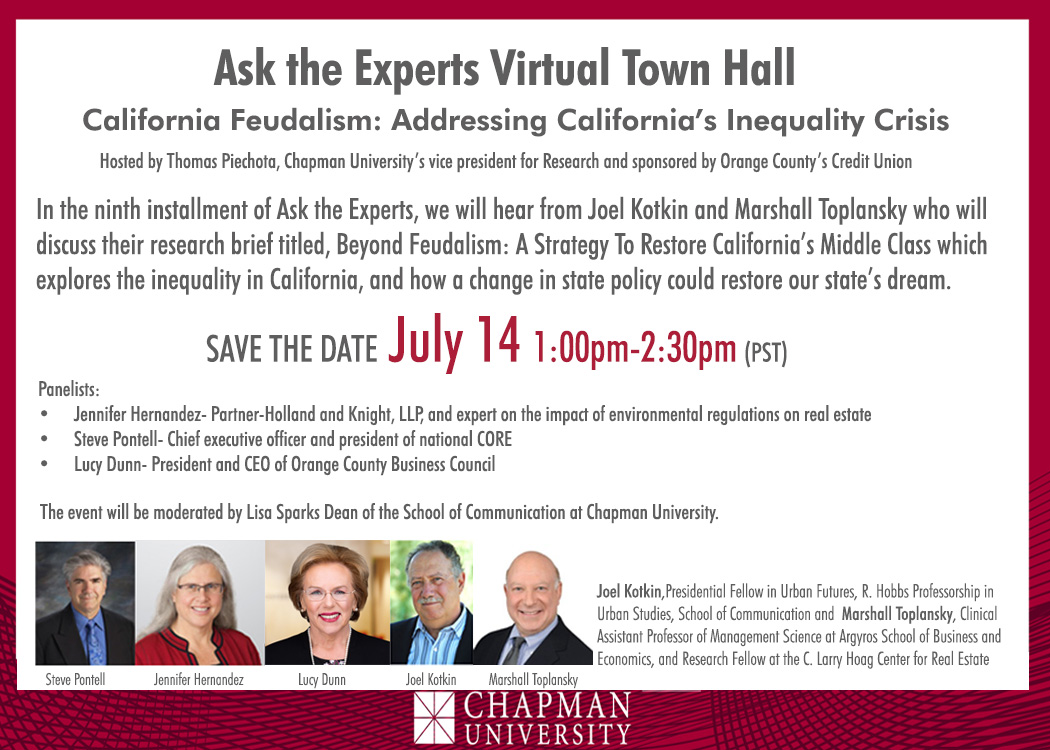In this new report, Beyond Feudalism: A Strategy to Restore California's Middle Class, Joel Kotkin and Marshall Toplansky examine how California has drifted toward feudalism, and how it can restore upward mobility for middle and working-class citizens. An excerpt from the report follows below:
“We are the modern equivalent of the ancient city-states of Athens and Sparta. California has the ideas of Athens and the power of Sparta. Not only can we lead California into the future, we can show the nation and the world how to get there.”
Arnold Schwarzenegger, January 2007
California Preening: A State Of Delusion
California has always been a state where excess flourished, conscious of its trend-setting role as a world-leading innovator in technology, economics and the arts. For much of the past century, it also helped create a new model for middle and working-class upward mobility while addressing racial, gender and environmental issues well in advance of the rest of the country.
The notion of California’s supremacy remains implanted on the minds of the state’s economic, academic, media and political establishment. “The future depends on us,” Governor Gavin Newsom said at his inauguration. “and we will seize this moment.” Progressive theorists like Laura Tyson and Lenny Mendonca laud California as the home of “a new progressive era” — an exemplar of social equity. Others see California as deserving of nationhood; it reflects, as a New York Times column put it, “...the shared values of our increasingly tolerant and pluralistic society.”
A Less Grandiose Reality
California’s ascent to its rank as the world’s fifth or sixth largest economy reflects its status as the hub of the “new” economy. Less often acknowledged, but also painfully true: the Golden State now exemplifies the nation’s lurch towards a new form of feudalism in which power and money are increasingly concentrated. Upward mobility is con-strained, and sometimes shocking levels of poverty remain widespread.
To be sure, the state has enjoyed faster income and job growth than the rest of the country over the past decade. But over the past few years, even before Covid-19, it has fallen behind other states, such as Texas, Utah, Washington, Nevada and Arizona. The state is often praised for its elaborate environmental and labor protections, but its record on economic mobility, middle-class disposable income, and even on greenhouse gas reductions, is not encouraging. The gap between middle-class Californians and the more affluent is becoming greater.
Recent trade conflicts, along with the implications of the coronavirus and other potential pandemics, could worsen this reality.6 In the past decade the hospitality, food service, performing arts and sports/casino sectors have accounted for a quarter of all new jobs, an increase in their share of all employment from 10.6% to 13.4%.7 Those two million jobs are now gravely threatened. Our position as a hub for trade with Asia and for global tourism is dependent on easy access to Chinese entrepreneurs and other partners world-wide. Damage to those relationships could make us more vulnerable. Our state’s population of poor and largely destitute people is also a vulnerability.
Read or download the full report here













